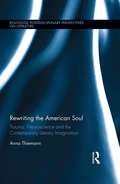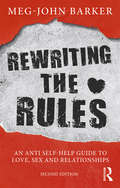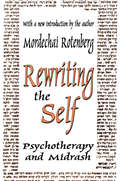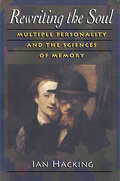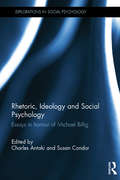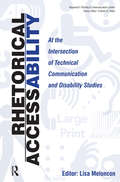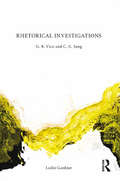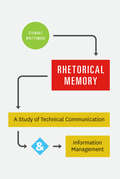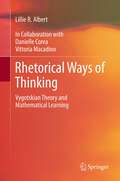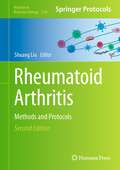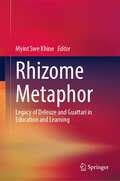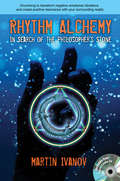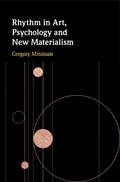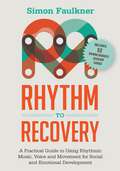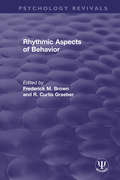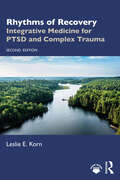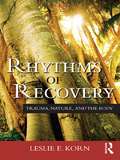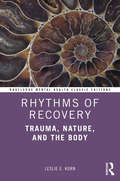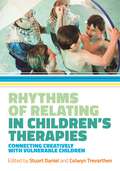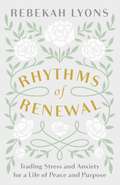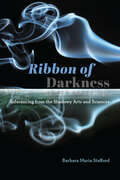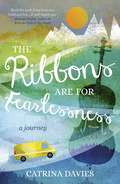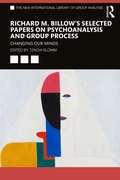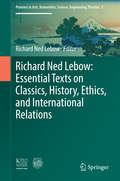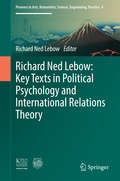- Table View
- List View
Rewriting the American Soul: Trauma, Neuroscience and the Contemporary Literary Imagination (Routledge Interdisciplinary Perspectives on Literature)
by Anna ThiemannRewriting the American Soul focuses on the political implications of psychoanalytic and neurocognitive approaches to trauma in literature, their impact on cultural representations of collective trauma in the United States, and their subversive appropriation in pre- and post-9/11 fiction. Anna Thiemann connects cutting edge trauma theory with the historical context from which it emerged and shows that contemporary novels encourage us to reflect critically on the cultural meanings and political uses of trauma. In doing so, it contributes to a new generation of trauma scholarship that challenges the dominant paradigm in literary and cultural studies. Moreover, the book intervenes in current debates about the relationship between literature and neuroscience insisting that the so-called neuronovel scrutinizes scientific developments and their political ramifications rather than adopting and translating them into aesthetic practices.
Rewriting the Rules: An Anti Self-Help Guide to Love, Sex and Relationships
by Meg John BarkerWe live in a time of uncertainty about relationships. We search for The One but find ourselves staying single because nobody measures up. We long for a happily-ever-after but break-up after break-up leave us bruised and confused. Rewriting the Rules: An Anti Self-Help Guide to Love, Sex and Relationships is a friendly guide through the complicated - and often contradictory - advice that's given about sex and gender, monogamy and conflict, break-up and commitment. It asks questions about the rules of love, such as which to choose from all the rules on offer? Do we stick to the old rules we learnt growing up, or do we try something new and risk being out on our own? And what about the times when the rules we love by seem to make things worse, rather than better? This new edition, updated throughout, considers how the rules are being 'rewritten' in various ways - for example in monogamish and polyamorous relationships, different ways of understanding sex and gender, and new ideas for managing commitment and break-up where economics, communities, or child-care make complete separation impossible. This book considers how the rules are being ‘rewritten’ in various ways, giving you the power to find an approach that best fits your situation.
Rewriting the Self: Psychotherapy and Midrash
by Mordechai RotenbergWhile the term midrash--from the Hebrew darash, searched or interpreted--can refer to both legal and extralegal scriptural exegesis, it most commonly refers to symbolic legends, stories, and parables used to make moral or ethical concepts accessible to the layman. As such, midrash encompasses an open-ended method of exposition that often allows for the coexistence of seemingly contradictory interpretations of holy writ in a kind of dialogue with each other. In Rewriting the Self, Mordechai Rotenberg illustrates how "midrashic" dialogue between a person's past and present may assist in the reorganization of ostensibly contrasting conditions or positions, so that by reinterpreting a failing past according to future aspirations, cognitive discord may be reduced and one may begin to rehabilitate and enhance one's life.Rotenberg argues that the foundations of what he calls a "dialogic" psychology of progress, as well as a pluralistic, free choice approach to psychotherapy, may be identified in Judaism's midrashic "metacode." From a practical, therapeutic perspective, a teacher or therapist would no longer be an elite interpreter of a student or client's past, authorized to give the only authentic analysis of that person's problems. Rather, he would be able to offer a variety of options, both rational and emotional. In Rewriting the Self, Rotenberg demonstrates his theory with several case studies of "rewriting" oneself from both the Midrash and Talmud. He contrasts this method with other psychotherapies. This volume is the third in a trilogy (the previous two, Damnation and Deviance and Hasidic Psychology, are also published by Transaction) that seeks to present a "dialogistic" psychology as an alternative framework to the perspective that predominates in Western social sciences. It is an original work that will be welcomed by psychotherapists, social scientists, and students of theology.
Rewriting the Soul: Multiple Personality and the Sciences of Memory
by Ian HackingTwenty-five years ago one could list by name the tiny number of multiple personalities recorded in the history of Western medicine, but today hundreds of people receive treatment for dissociative disorders in every sizable town in North America. Clinicians, backed by a grassroots movement of patients and therapists, find child sexual abuse to be the primary cause of the illness, while critics accuse the "MPD" community of fostering false memories of childhood trauma. Here the distinguished philosopher Ian Hacking uses the MPD epidemic and its links with the contemporary concept of child abuse to scrutinize today's moral and political climate, especially our power struggles about memory and our efforts to cope with psychological injuries. What is it like to suffer from multiple personality? Most diagnosed patients are women: why does gender matter? How does defining an illness affect the behavior of those who suffer from it? And, more generally, how do systems of knowledge about kinds of people interact with the people who are known about? Answering these and similar questions, Hacking explores the development of the modern multiple personality movement. He then turns to a fascinating series of historical vignettes about an earlier wave of multiples, people who were diagnosed as new ways of thinking about memory emerged, particularly in France, toward the end of the nineteenth century. Fervently occupied with the study of hypnotism, hysteria, sleepwalking, and fugue, scientists of this period aimed to take the soul away from the religious sphere. What better way to do this than to make memory a surrogate for the soul and then subject it to empirical investigation? Made possible by these nineteenth-century developments, the current outbreak of dissociative disorders is embedded in new political settings. Rewriting the Soul concludes with a powerful analysis linking historical and contemporary material in a fresh contribution to the archaeology of knowledge. As Foucault once identified a politics that centers on the body and another that classifies and organizes the human population, Hacking has now provided a masterful description of the politics of memory : the scientizing of the soul and the wounds it can receive.
Rhetoric, Ideology and Social Psychology: Essays in honour of Michael Billig (Explorations In Social Psychology Ser.)
by Charles Antaki Susan CondorProfessor Michael Billig is one of the most significant living figures in social psychology. His work spans thirty-five years, and has at times challenged conventional social scientific thinking on a range of key topics. Billig has influenced a wide range of fields including intergroup conflict, social attitudes and ideology, rhetoric, racism, nati
Rhetorical Accessability: At the Intersection of Technical Communication and Disability Studies (Baywood's Technical Communications)
by Lisa MelonconRhetorical Accessability is the first text to bring the fields of technical communication and disability studies into conversation. The two fields also share a pragmatic foundation in their concern with accommodation and accessibility, that is, the material practice of making social and technical environments and texts as readily available, easy to use, and/or understandable as possible to as many people as possible, including those with disabilities. Through its concern with the pragmatic, theoretically grounded work of helping users interface effectively and seamlessly with technologies, the field of technical communication is perfectly poised to put the theoretical work of disability studies into practice. In other words, technical communication could ideally be seen as a bridge between disability theories and web accessibility practices. While technical communicators are ideally positioned to solve communication problems and to determine the best delivery method, those same issues are compounded when they are viewed through the dual lens of accessibility and disability. With the increasing use of wireless, expanding global marketplaces, increasing prevalence of technology in our daily lives, and ongoing changes of writing through and with technology, technical communicators need to be acutely aware of issues involved with accessibility and disability. This collection will advance the field of technical communication by expanding the conceptual apparatus for understanding the intersections among disability studies, technical communication, and accessibility and by offering new perspectives, theories, and features that can only emerge when different fields are brought into conversation with one another and is the first text to bring the fields of technical communication and disability studies into conversation with one another.
Rhetorical Investigations: G. B. Vico and C. G. Jung
by Leslie GardnerRhetorical analysis of texts exposes plausible ‘truths’ and presumptions implied by the writer’s presentation. In this volume, Leslie Gardner analyses the master psychologist Jung, who claimed to be expert at uncovering personal, psychological truths. In his theoretical writings, his rhetoric reveals philosophical ramifications which bear strong similarities to those of the rhetorician of the 18th century, Italian philosopher Giambattista Vico. This book is driven by an interest in arguing that it is possible to read Jung’s works easily enough when you have a set of precepts to go by. The paradox of scientific discovery being set out in Jung’s grotesque and arcane imagery begins to seem a startling and legitimate psychology for the 21st century. It is time Jungian studies took on this most appropriate examination of analytical psychology. Bringing Vico to bear directly on Jung’s thought has only been cursorily attempted before although much alluded to. We find indeed that some of Jung’s ideas derive directly from rhetorical theory, and this volume proposes to highlight Jung’s innovations, and bring him into forefront of contemporary psychological thought. Rhetorical Investigations will be of interest to analysts and academics, and also to those studying philosophy and psychology.
Rhetorical Memory: A Study of Technical Communication and Information Management
by Stewart WhittemoreInstitutions have regimes--policies that typically come from the top down and are meant to align the efforts of workers with the goals and mission of an institution. Institutions also have practices--day-to-day behaviors performed by individual workers attempting to interpret the institution's missives. Taken as a whole, these form a company's memory regime, and they have a significant effect on how employees analyze, mix, translate, sort, filter, and repurpose everyday information in order to meet the demands of their jobs, their customers, their colleagues, and themselves. In Rhetorical Memory, Stewart Whittemore demonstrates that strategies we use to manage information--techniques often acquired through trial and error, rarely studied, and generally invisible to us--are as important to our success as the end products of our work. First, he situates information management within the larger field of rhetoric, showing that both are tied to purpose, audience, and situation. He then dives into an engaging and tightly focused workplace study, presenting three cases from a team of technical communicators making use of organizational memory during their everyday work. By examining which techniques succeed and which fail, Whittemore illuminates the challenges faced by technical communicators. He concludes with a number of practical strategies to better organize information, that will help employees, managers, and anyone else suffering from information overload.
Rhetorical Ways of Thinking
by Lillie R. Albert Danielle Corea Vittoria MacadinoRhetorical Ways of Thinking focuses on how the co-construction of learning models the interpretation of a mathematical situation. It is a comprehensive examination of the role of sociocultural-historical theory developed by Vygotsky. This book puts forward the supposition that the major assumptions of sociocultural-historic theory are essential to understanding the theory's application to mathematical pedagogy, which explores issues relevant to learning and teaching mathematics-in-context, thus providing a valuable practical tool for general mathematics education research. The most important goal, then, is to exemplify the merging of the theory with practice and the subsequent applications to mathematics teaching and learning. This monograph contains five chapters, including a primer to Vygotsky's sociocultural historic theory, three comprehensive empirical studies examining: prospective teachers' perception of mathematics teaching and learning and the practice of scaffolded instruction to assist practicing teachers in developing their understanding of pedagogical content knowledge. Finally, the book concludes with a contextualization of the theory, linking it to best practices in the classroom.
Rheumatoid Arthritis: Methods and Protocols (Methods in Molecular Biology #2766)
by Shuang LiuThis second edition explores standard laboratory protocols and methodology commonly used in basic and translational studies in the field of rheumatoid arthritis (RA) treatment. Chapters detail including basic RA models, evaluation of disease activity and immunological status, systemic drug delivery, and new research tools. Written in the highly successful Methods in Molecular Biology series format, chapters include introductions to their respective topics, lists of the necessary materials and reagents, step-by-step, readily reproducible laboratory protocols, and key tips on troubleshooting and avoiding known pitfalls. Authoritative and cutting-edge, Rheumatoid Arthritis: Methods and Protocols, Second Edition aims to be a basic manual for clinical researchers who are just getting started in the field of intervention study.
Rhizome Metaphor: Legacy of Deleuze and Guattari in Education and Learning
by Myint Swe KhineThis comprehensive volume highlights the paradigm shift, creative approaches, and theoretical and practical aspects of rhizomatic learning. The great French theorists Deleuze and Guattari introduced the concept of the rhizome to allow educators to explore the educative process with the rhizomatic lens. The chapters cover digital pedagogies, the conceptual framework of rhizome and nomadic pedagogy in 21st-century education. It creates rhizomatic learning environments and rhizome metaphors to illuminate learning and teacher professional development. It covers an extensive range of issues and challenges related to teaching and learning in the techno centric education systems. It presents an up-to-date and comprehensive analysis of rhizomatic learning approaches in various disciplines. It examines the following key questions: What is the conception of rhizomatic learning and nomadic pedagogy? In which ways can rhizomatic learning transform teaching methods in the digital era? How can educators implement a rhizomatic learning approach in practice? What is the connection between the rhizomatic process and divergent thinking in socially mediated and technology-driven learning environments? Combining theory and practice, this book is essential reading for educational policymakers, teacher educators, university faculty, researchers, instructional designers, learning technologists, teachers, and undergraduate and graduate students worldwide.
Rhythm Alchemy
by Martin IvanovAccording to Socrates, humans have nothing more to learn because we already know everything we need to know. We have simply forgotten it. A true teacher is one who can help us to remember forgotten knowledge. The great Michelangelo perceived his unique creations in rough and uncultured stone blocks. He said that to see the finished sculpture, one only needs to eliminate the unnecessary particles and debris. Just like these stone blocks, we all possess hidden and forgotten wisdom. To live our true nature, we need to separate ourselves from our limited beliefs and understandings. This is the very essence of the book you have in your hands. #147;Rhythm Alchemy” is full of insights from ancient times and from our deepest self. The book synthesizes the ancient knowledge of numbers, the heartbeat, the rhythm of breathing and our personal situation within the bigger, universal vibrations, as well as our interactions with people and nature around us. #147;Rhythm Alchemy” offers invaluable knowledge about ourselves and the unique harmony between the human being, his or her inner world, his or her rhythm and the surrounding reality. We may not realize how often we use musical terms like rhythm, melody and harmony to refer to things which happen to us in our daily lives: the rhythm of our heart, how our feelings soar in space, the melody of our personal inner voice trying to interweave with the harmony of other voices around us. We are constantly seeking and wanting to write the composition of our "happiness". When we compose this work, even though we tirelessly seek inspiration from outside us, our score often stays blank. This is because we do not pay sufficient attention to the true inspiration which lies within us. In order to reach this inspiration, we need to rebuild the bridges linking us to the roots of our true nature #150; rhythm. When we begin the intimate dance with the vibrations of our existence and begin to experience the real flavor of each wave which colors our emotions, then we will attain the creative power of the composer expressed in what we call #147;happiness”. Martin Ivanov’s book "Rhythm Alchemy" provides us with the spiritual and physical parameters of our cosmic score. It will guide us to our place in the composition and provide us with the ideas and knowledge we need to participate fully in both #150; how to compose our life and fulfill our innermost dreams.
Rhythm in Art, Psychology and New Materialism
by Gregory MinissaleThis book examines the psychology involved in handling, and responding to, materials in artistic practice, such as oils, charcoal, brushes, canvas, earth, and sand. Artists often work with intuitive, tactile sensations and rhythms that connect them to these materials. Rhythm connects the brain and body to the world, and the world of abstract art. The book features new readings of artworks by Matisse, Pollock, Dubuffet, Tápies, Benglis, Len Lye, Star Gossage, Shannon Novak, Simon Ingram, Lee Mingwei, L. N. Tallur and many others. Such art challenges centuries of philosophical and aesthetic order that has elevated the substance of mind over the substance of matter. This is a multidisciplinary study of different metastable patterns and rhythms: in art, the body, and the brain. This focus on the propagation of rhythm across domains represents a fresh art historical approach and provides important opportunities for art and science to cooperate.
Rhythm to Recovery: A Practical Guide to Using Rhythmic Music, Voice and Movement for Social and Emotional Development
by Simon Faulkner James OshinskyCombining rhythmic music and movement with cognitive reflection and mindfulness, this comprehensive handbook shows how drumming and other rhythm-based exercises can have a powerful effect in individual, group and family settings. Incorporating the latest research on how rhythmic music impacts the brain, this book features over 100 different exercises spanning five key developmental areas: social and emotional learning; identity and culture; strengths and virtues; health and wellbeing; and families, teams and communities. It offers a safe entry to cognitive reflection through fun, experiential rhythmic exercises and is useful for working in settings such as school, child and adolescent counselling settings, mental health and drug and alcohol interventions, trauma counselling and relational counselling. Important sections on the use of metaphor and analogy show how to reinforce experiential outcomes. The book also contains helpful sections on working with specific populations, key facilitation skills and managing challenging behaviours. Downloadable resources such as evaluation forms, certificates and 52 session cards optimise the process of implementing this approach in practice.
Rhythmic Aspects of Behavior (Psychology Revivals)
by Frederick M. Brown; R. Curtis GraeberOriginally published in 1982, this book provides rich evidence of the relevance of the temporal aspects of behavior. The generalized areas of learning, memory, operant scheduled behavior, task performance, vigilance, mood and motivation and their rhythmic components are explored in varying detail. The particularized measures range from on-the-job errors, through reading efficiency to milliseconds of change in reaction time in the laboratory. The subjects range from ants to older persons. Across this range of settings, subjects, and behaviors, the message is clear: there is an interaction between time and behavior.
Rhythms of Recovery: Integrative Medicine for PTSD and Complex Trauma
by Leslie E. KornRhythm is one of the most important components of our survival and well-being. It governs our moods, sleep, respiration, and digestion, and is profoundly tied to our relationships with friends and family. But what happens when these rhythms are disrupted by traumatic events? How can balance be restored in ways that integrate the complex needs of mind, body, and spirit? What insights do eastern, natural, and modern western healing traditions have to offer, and how can practitioners put these lessons to use? Clients walk through the door with chronic physical and mental health problems as a result of complex traumatic events—how can clinicians make a quick and skillful connection with their clients’ needs and offer integrative mind/body methods they can rely upon?Rhythms of Recovery answers these questions and provides clinicians with effective, time-tested tools for alleviating the destabilizing effects of traumatic events. In the new edition, readers will find practical methods, illuminated by clinical vignettes, for integrating psychotherapies with somatics and bodywork, yoga, nutrition, herbs, psychedelic medicines, and more. The new edition also draws out the ways in which culture, social justice, and feminism intersect with the integrative medicine revolution in mental health. For mental health practitioners and students interested in integrating the art and science of complementary and integrative health, this deeply appealing book provides a comprehensive guide.
Rhythms of Recovery: Trauma, Nature, and the Body
by Leslie E. KornRhythm is one of the most important components of our survival and well-being. It governs the patterns of our sleep and respiration and is profoundly tied to our relationships with friends and family. But what happens when these rhythms are disrupted by traumatic events? Can balance be restored, and if so, how? What insights do eastern, natural, and modern western healing traditions have to offer, and how can practitioners put these lessons to use? Is it possible to do this in a way that’s culturally sensitive, multidisciplinary, and grounded in research? Clients walk through the door with chronic physical and mental health problems as a result of traumatic events—how can clinicians make quick and skillful connection with their clients’ needs and offer integrative mind/body methods they can rely upon? Rhythms of Recovery not only examines these questions, it also answers them, and provides clinicians with effective, time-tested tools for alleviating the destabilizing effects of traumatic events. For practitioners and students interested in integrating the insights of complementary/alternative medicine and 21st-century science, this deeply appealing book is an ideal guide. Rhythms of Recovery provides 10 continuing education units through the Massachusetts Mental Health Counselor Education Home study program (exam required): http://www.mamhca.org/lmhcs/home-study-program/
Rhythms of Recovery: Trauma, Nature, and the Body (Routledge Mental Health Classic Editions)
by Leslie E. KornThe classic edition of Rhythms of Recovery sheds light on rhythm, one of the most important components of our survival and well-being. It governs the patterns of our sleep and respiration and is profoundly tied to our relationships with friends and family. But what happens when these rhythms are disrupted by traumatic events? Can balance be restored, and if so, how? What insights do eastern, natural, and modern western healing traditions have to offer, and how can practitioners put these lessons to use? Is it possible to do this in a way that’s culturally sensitive, multidisciplinary, and grounded in research? Rhythms of Recovery examines and answers these questions and provides clinicians with effective, time-tested tools for alleviating the destabilizing effects of traumatic events. It also explores integrative medicine, East/West medicine, herbal medicine, psychedelic medicine, complex trauma, yoga, and somatic and feminist therapies. For practitioners and students interested in integrating the insights of complementary/alternative medicine and 21st-century science, this deeply appealing book is an ideal guide.
Rhythms of Relating in Children's Therapies: Connecting Creatively with Vulnerable Children
by Peter Levine Sarah Butler Tim Webb Jane Edwards Penny Mcfarlane Dennis Mccarthy Dan Hughes Stine Lindahl Jacobsen Colwyn Trevarthen Cochavit Elefant Judi Parson Ana Almeida Bodo Frank Carolyn Fresquez Chantal Polzin Dee Ray Foteini Athanasiadou Helena Rodrigues Hugh Nankivell Josephat Semkiwa Katy Dymoke Nigel Osborne Paulo Rodrigues Stephen Malloch Stephen Porges Stuart Daniel Ulrike Lüdtke Vicky KarkouThis multidisciplinary book shows how to foster meaningful relationships between therapists and vulnerable children, through exploring the concept of communicative musicality and creating rhythms of connection. It includes broad and in-depth contributions from leading therapists from diverse backgrounds - including Peter A. Levine, Daniel Hughes, Stephen Porges, Dennis McCarthy and many more. Contributors reflect on their own experiences, providing insights from the fields of music therapy, trauma, dance and movement therapy, psychobiology, dramatherapy, counselling, play therapy, and education. Contemporary theory is woven in with case stories to highlight the emotional realities of working with highly vulnerable children, and to present proven examples of how therapists can improve the quality of connectedness. Full of original and innovative ideas for working with attachment issues, trauma, communication difficulties, autism, learning disabilities, aggression and anxiety, this is inspiring reading for professionals who work with vulnerable children in creative therapies. Royalty proceeds from the book will be donated to the National Society for the Prevention of Cruelty to Children (NSPCC), UK.
Rhythms of Renewal: Trading Stress and Anxiety for a Life of Peace and Purpose
by Rebekah LyonsDaily struggles with anxiety and stress make it difficult to receive God's peace. Rhythms of Renewal will help you trade your anxiety for the vibrant life you were meant to live through four profound rhythms: rest, restore, connect, and create. With encouraging stories and practical steps, Rebekah Lyons will help you begin an intentional, lifelong journey toward sustained emotional, relational, and spiritual health.Rhythms of Renewal is your guide to daily rescue and a way forward into the peace your soul longs for. As a society, we are in the throes of a collective panic attack. Anxiety and loneliness are on the rise, with 77% of our population experiencing physical symptoms of stress on a regular basis. We feel pressure chasing careers, security, and keeping up. We worry about health, politics, and many other complexities we can't control. Eventually we find our minds spinning, trying to cope or manage a low hum of anxiety, unlike ever before. But it doesn't have to stay this way. Rebekah draws from her own battle with depression and anxiety and shares a pathway to establish four life-giving rhythms that quiet inner chaos and make room for a flourishing life. By taking time to rest, restore, connect, and create, you will discover how to: Take charge of your emotional health and inspire your loved ones to do the sameOvercome anxiety by establishing daily habits that keep you mentally and physically strongFind joy through restored relationships in your family and communityWalk in confidence with the unique gifts you have to offer the world
Ribbon of Darkness: Inferencing from the Shadowy Arts and Sciences
by Barbara Maria StaffordOver the course of her career, Barbara Stafford has established herself the preeminent scholar of the intersections of the arts and sciences, articulating new theories and methods for understanding the sublime, the mysterious, the inscrutable. Omnivorous in her research, she has published work that embraces neuroscience and philosophy, biology and culture, pinpointing connections among each discipline’s parallel concerns. Ribbon of Darkness is a monument to the scope of her work and the range of her intellect. At times associative, but always incisive, the essays in this new volume take on a distinctly contemporary purpose: to uncover the ethical force and moral aspects of overlapping scientific and creative inquiries. This shared territory, Stafford argues, offers important insights into—and clarifications of—current dilemmas about personhood, the supposedly menial nature of manual skill, the questionable borderlands of gene editing, the potentially refining value of dualism, and the limits of a materialist worldview. Stafford organizes these essays around three concepts that structure the book: inscrutability, ineffability, and intuitability. All three, she explains, allow us to examine how both the arts and the sciences imaginatively infer meaning from the “veiled behavior of matter,” bringing these historically divided subjects into a shared intellectual inquiry and imbuing them with an ethical urgency. A vanguard work at the intersection of the arts and sciences, this book will be sure to guide readers from either realm into unfamiliar yet undeniably fertile territory.
Ribbons Are for Fearlessness: My Journey from Norway to Portugal beneath the Midnight Sun
by Catrina Davies"Read this book if you have ever loved and lost. . . . It will inspire you. ” --Monique Roffey, author of With the Kisses of His Mouth Fuzzy-haired, neurotic, cello-playing Catrina is devastated when her lover, Jack, leaves her to go surfing on the other side of the world. Trapped in a dead-end job and torn by his departure, Catrina dreams of running away. But how do you run away when you’re flat broke? Luckily, her friend Andrew comes up with a plan: they’ll get an old van, turn it into a camper, and busk their way from Norway to Portugal, via the midnight sun. Andrew is one of her oldest friends and they share many of the same passions and interests, including music. When Andrew is killed in a tragic accident, Catrina decides to go it alone, encountering one disaster after another. She sleeps in her van, gets lost, and struggles to find the confidence to play her cello in front of her growing audience, but meets complete strangers who offer her advice, encouragement, and support along the way. Her experiences on the road gradually teach her the real meaning of love, courage, and above all else, the importance of following her dreams. This is an unforgettable story of a journey like no other--a deeply emotional and inspirational debut by a unique storyteller.
Richard M. Billow's Selected Papers on Psychoanalysis and Group Process: Changing Our Minds (The New International Library of Group Analysis)
by Richard M. Billow Tzachi SlonimThis comprehensive volume presents Richard M. Billow’s unique contributions to the theory and technique of psychotherapy, along with summaries and explications by the volume’s editor, Tzachi Slonim. Through their behavior, therapists define the clinical culture: how relationships are to be regarded and the depth to which narratives and exchanges may be considered. Known for his integration of Bion’s metapsychology with contemporary psychoanalysis, Billow extends our understanding of "relational" to include the emotional relationships people have with individual and collective ideas, and the behaviors attached to these ideas. "Doing our work" (the title of the last section) involves the therapist’s whole being, including cognitions, dreams, words, deeds, and very presence—mental and somatic. Drawing on Lacan, Billow suggests that therapeutic work ought to include a willingness to penetrate other minds with provocative, controversial ideas. His clinical vignettes portray a masterly clinician-in-action, describing his evolving feelings, thoughts, and assessments. Billow’s intimate knowledge of Bionian theory, coupled with his down-to-earth demeanour and clear writing, allows him to explicate and expand upon Bion’s important contributions in a manner accessible to the novice and expert therapist alike. With one eye on therapeutic process, and the other on each participant including the therapist himself, Billow invites each of us to change our minds.
Richard Ned Lebow: Essential Texts on Classics, History, Ethics, and International Relations
by Richard Ned LebowThis last one out of four volumes by Richard Ned Lebow in this book series focuses on various fields of social sciences and their connection to international politics. The author writes about topics in psychology, tragedy, and ethics. All of these fields are being put into relation with political aspects, especially international relations.
Richard Ned Lebow: Key Texts in Political Psychology and International Relations Theory
by Richard Ned LebowThis third out of four volumes by Richard Ned Lebow in this book series includes texts on psychology and international relations, causation, counterfactual analysis. The political psychology contributions draw on richer, ancient Greek understandings of the psyche and offer novel insights into strategies of conflict management, the role of emotions in international relations, and the modern fixation on identity.
